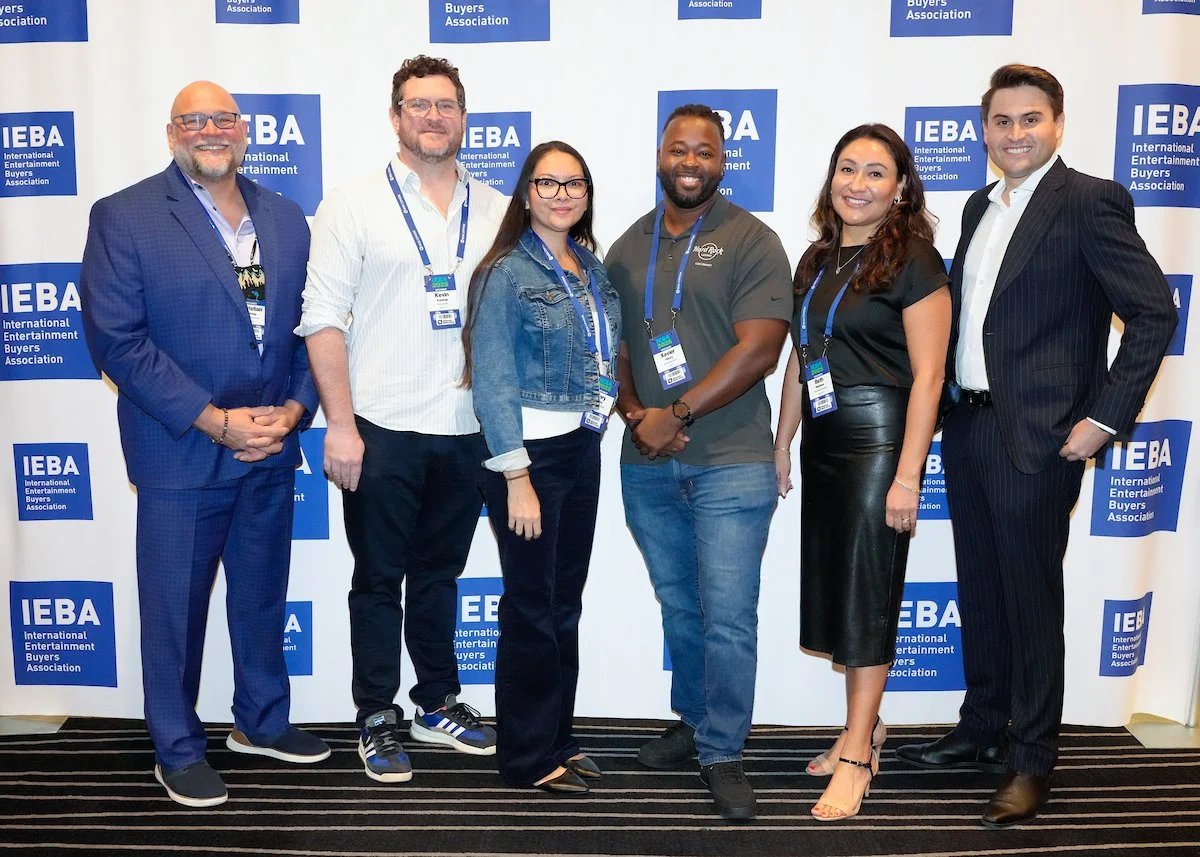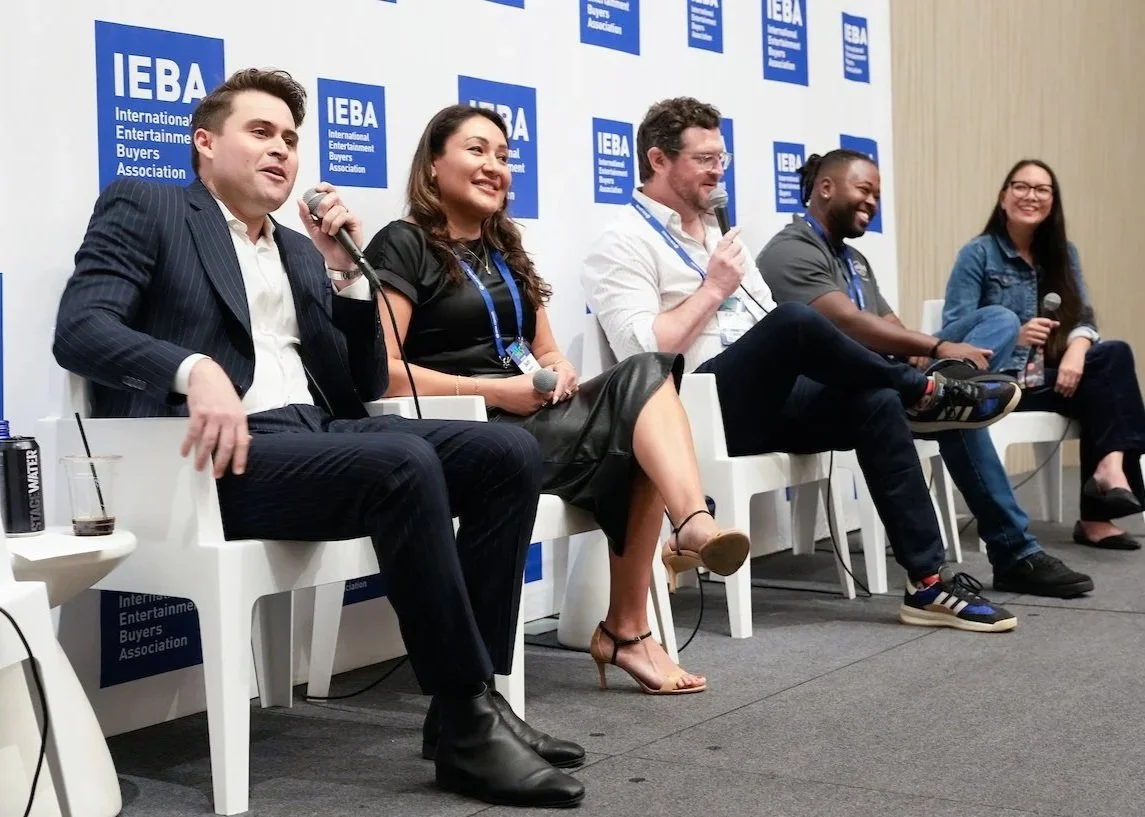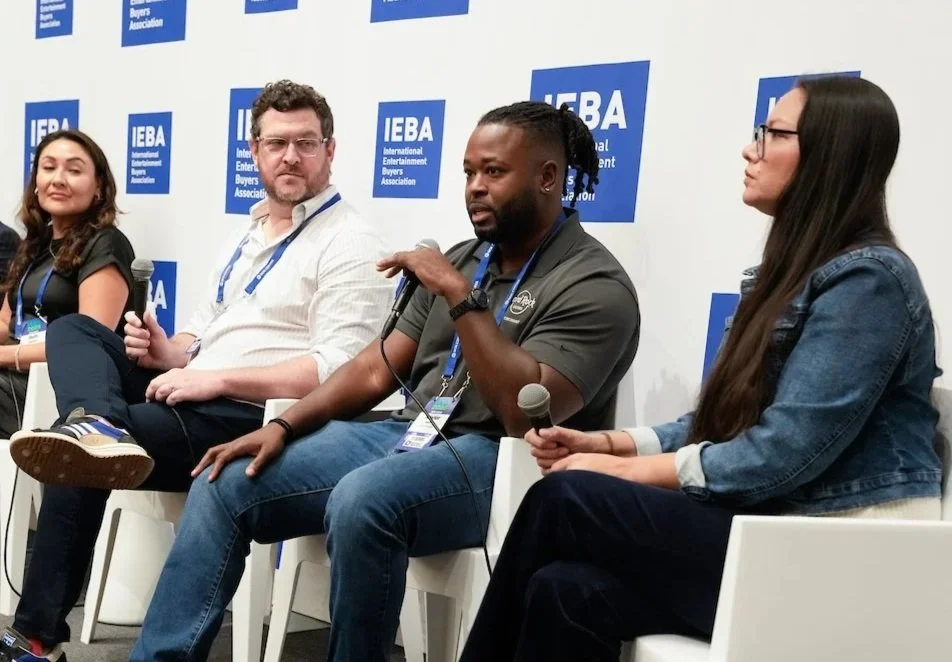PICK A WINNER: BUYING CASINO ENTERTAINMENT
Panelists:
Joe Grossman, UTA Comedy
Xavier Henry, Hard Rock International
Kevin Kastrup, Wasserman Music
Mary Moon, Tachi Palace Casino Resort
Beth Nephew, Seneca Gaming Corporation
Moderated by: Christian Printup, Foxwoods Resort Casino
Sponsored by: Houston Productions
“Tribal properties now make up nearly half of all U.S. casinos,” opened moderator Christian Printup (Foxwoods Resort Casino). He dedicated the session to the late Ernie Stevens, longtime chairman of the Indian Gaming Association: “His work helped make tribal gaming the largest segment of gaming in the country.” The panel—made up entirely of tribal or tribally owned enterprises and their partners—dug into what’s actually working in casino entertainment right now, and how to keep winning as the market shifts.
What’s Really Selling in Casino Showrooms
“Comedy has been the steadiest thing I book,” said Xavier Henry. Across his Hard Rock properties, acts like Ron White and Rodney Carrington consistently overperform, regardless of market.
On the agency side, Joe Grossman called comedy “the surest bet in entertainment right now,” pointing to Nikki Glaser as the breakout example. “Nikki’s a 20-year overnight success story. After the Tom Brady roast, her demand jumped overnight. Buyers who called the next morning got great deals and instant sell-outs. Within two weeks, the quote had tripled.”
At Seneca Resorts & Casinos, nostalgia and classic rock still pack the house. “We did two outdoor nights in Niagara Falls,” said Beth Nephew. “Darius Rucker one night, then Toto, Christopher Cross, and Men At Work the next. Both nights pushed about 5,000 tickets and anchored the whole weekend for the property.”
In California’s Central Valley, Mary Moon leans into what fits her ag-heavy market. “Country is king for us—Chris Young did fantastic,” she said. “And Thunder From Down Under is still a guaranteed ladies’ night.”
Printup likened programming to feeding regulars at your house. “If you know they love steak and potatoes, don’t suddenly serve sushi. But every so often, slip in an asparagus—take a calculated risk and see what happens.” Henry added that Hard Rock tries to “catch rising heat” with acts like Teddy Swims and YUNGBLUD: “They bring a younger demo without losing the casino’s core player.”
Cash vs. Comps: What Counts as a “Win”?
For tribal and regional properties, the true scoreboard isn’t just ticket sales.
“At the end of the day, we’re judged on casino lift,” said Nephew. “Slot win, table drop, hotel, food and beverage—that’s how leadership looks at entertainment.” She distinguishes between cash shows (new faces, strong ticketing) and player shows (heavier on comps): “The goals differ, and I make sure our execs know which lever we’re pulling each night.”
Henry’s Hard Rock rooms are more hard-ticket driven. “We’re maybe 85–90% paid tickets, 10–15% comps,” he said. “We want the room full of fans—that keeps the artist happy and still hits our F&B and floor numbers.”
Grossman warned that over-comping the front rows can hurt long-term. “If the first 10–20 rows are all comps who don’t care, the artist sees that. They’re talking, on their phones, or not reacting. That’s how you end up with a ‘one and done’ situation.”
Kevin Kastrup agreed: “Artists want to feel demand. When they walk onstage and see energized fans—not empty seats or people who don’t know why they’re there—they’re far more likely to come back.”
The sweet spot? A balanced mix: enough comps to reward players and drive gaming, but not so many that the energy or optics suffer.
New Casino Audiences, New Casino Acts
As legacy “casino staples” retire or slow down, properties are recalibrating to new generations.
“We never thought we’d be booking rap and hip-hop,” said Nephew. “But those fans are now our age—they’ve grown up, they have money, and they’re coming to casinos.”
Henry sees similar trends with ’90s rock and Christian rock. “Skillet surprised a lot of people,” he said. “They sold out in multiple casinos. Guests want lively experiences—high energy, sing-alongs, big moments.”
For comedy, Grossman said the field is wide open. “There’s no ‘casino-only’ comedy roster. From Lewis Black to Ralph Barbosa, they’ll all find their audience in your showroom if you treat them right. ”Moon emphasized variety for tribal markets. “Our guests are coming for the whole resort experience—hotel, games, food, shows. Entertainment has to evolve with them, or they’ll go elsewhere.”
Hospitality as Strategy: How Artists Choose Your Casino
“The first thing artists ask about is production,” said Kastrup. “The second is the green room. Is it clean? Comfortable? Smoke-free? That matters.”
Grossman added that crews often decide where tours return. “Tour managers can smell it immediately—do you have a professional crew? Is the advance smooth? If they feel like they’re teaching your team how to do a show, they’ll raise a red flag.”
Henry said Hard Rock has invested heavily to meet touring standards. “If your tech, catering, and hospitality match the arena down the road, the casino stigma disappears. Then you’re just ‘the best room in the market’ that happens to have a gaming floor.”
Grossman reframed entertainment as a branding deal: “You’re not just buying a show. You’re buying the right to plaster that artist’s face on your billboards and digital campaigns. To get a major act to endorse your casino outright would cost far more than their fee. Entertainment is one of the best value marketing tools you have.”
Economy, Pricing & Booking Strategy for 2026
Rising costs and price-sensitive guests are reshaping strategy.
“The middle tier is the hardest right now,” said Henry. “We’re seeing more last-minute buying, so our marketers are shifting spend later into the cycle—we’ve had shows with huge week-of spikes.”
Nephew is stretching timelines: “We’re putting shows on sale earlier—sometimes six to eight months out—to give people more time to decide and budget. And we’re alternating bigger ‘anchor’ acts with more comp-heavy or lower-fee shows to balance the year.”
Printup added that Foxwoods is staying aggressive but smarter. “We’re not pulling back—we’re tightening. Longer on-sale windows, more selective offers, and realistic expectations about week-of movement.”
The panel also pushed for midweek shows. “Your property is already busy Friday and Saturday,” said Grossman. “Why not blow out a Wednesday?” Henry backed it up with data: “We did YUNGBLUD on a Monday in Ottawa—that was the best Monday in the property’s history for the casino floor.”
Changing Perceptions & Playing the Long Game
If the industry could fix one thing, Kastrup said, it would be the perception of casinos among some artists and colleagues.
“Too many people still hear ‘casino’ and picture a flat ballroom with bad sound,” he explained. “But a lot of you have the best venues in your markets. The challenge is educating agents and managers—show them photos, tech specs, the real experience.”
Henry put it simply: “If you follow touring-industry standards—advances, tech packs, hospitality—you’re no different than any great hard-ticket room.”
Grossman stressed that agents are playing a long game too. “Yes, we want to make our artists money,” he said. “But not at the cost of wrecking the show or the relationship. I’m not trying to smash-and-grab. I want to book with you for 20 or 30 years. Fair deals and good experiences keep everyone in business.”
Printup closed by reminding the room that “we’re one ecosystem”: “Artists are businesses. Casinos are businesses. Everybody’s costs have gone up—fuel, buses, crews, staffing. The only way we all win is by being honest about value, knowing our markets, and treating each other like partners instead of opponents.”
Takeaways
Comedy is the safest bet. From legacy names to rising podcasters and social-native comics, comedy continues to over-index in casino showrooms.
Program to your market. Country, Latin, ’90s rock, Christian rock, hip-hop, drag brunches—know who lives around you and feed that demand while testing new lanes carefully.
Balance hard tickets and comps. Too many comps up front can kill the energy. Target players strategically while keeping fans in the best seats.
Hospitality is leverage. Professional crews, solid production, clean green rooms, and backstage catering earn artist loyalty and repeat routing.
Use midweek to your advantage. Wednesdays and Mondays can become record days with the right artist—and won’t cannibalize your existing weekend traffic.
Tell your story like a venue, not just a casino. Robust tech packs, photos, and clear communication help agents sell your room internally.
Think long-term, not one-off. Fair deals, realistic pricing, and shared risk keep artists, agents, and casinos working together for years—not just one tour.





